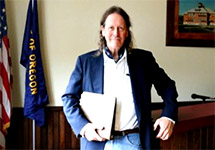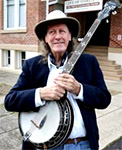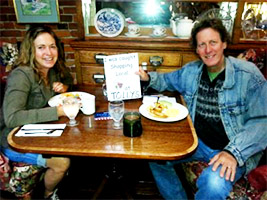Oakland, Oregon Mayor Tom Hasvold (Ecuador)
Tom Hasvold’s (Ecuador 1983-85) career formed itself the day in 1982 he walked across the student union at the University of Colorado and spied a bearded man sitting between a Peace Corps banner and a sign-up sheet.

Oakland, Oregon Mayor Tom Hasvold poses for a photograph at city hall in Oakland in November.
Six months later, Hasvold had a passport and a job in South America. He also launched a passion for connecting people with outdoor spaces and natural resources. That vocation carries over today into his role as Oakland, Oregon’s mayor.
“He loves parks and likes to keep them up and functional for everyone in the city,” said Terri Long, who retired in July as Oakland’s city recorder but continues as a contracted planning clerk. “He’s an outdoorsman himself, and he likes to see a lot of open spaces so citizens have comfortable places to go outside.”
James Hart, Oakland’s director of public works, agreed that Hasvold seeks to boost community assets that everyone can use. When the city recently completed a disc golf course with a wooden gazebo, Hart said “Most people who use (the course) are very impressed a small town had pulled this off. That was directly because of his efforts.”
Ensuring a reliable water supply is also high on Hasvold’s priority list for the city. Early in his term, Hasvold said he asked city councilors to defer water and sewer rate increases for a year.
“We have more grants coming up for improving our water systems and also for more emergency preparedness,” Hasvold said. “We want to help with making things more affordable, and to function well in the future.”
City government is one of several topics revolving through Hasvold’s mind as he goes about his professional duties with the U.S. Forest Service. He’s a collections officer with the forest service’s seasonal recreation department. As he fetches, counts and delivers campground fees, Hasvold said he’s usually thinking about laws, the Constitution — and songs.
Hasvold, 60, said he’s studied the Constitution at length. Those who haven’t may find a lot to surprise them, he said. “People talk about it a lot, They’ll read 1,000 pages of Harry Potter, but they haven’t read 20 pages of the Constitution.”

In addition to his duties to the city, Oakland Mayor Tom Hasvold is an avid banjo player, first having taken up the instrument as a 5-year-old.
As for the songs, Hasvold picked up an affinity for bluegrass music in his youth and never let it go. He performs on occasion and is usually working on song lyrics during quiet periods. His themes are multidimensional.
“I end up with a lot of metaphors like a highway or a river or a weather change,” he said. “They’re images of the natural world through which we can all understand our shared experiences.”
The natural world called to Hasvold early in his life. He was born in the United Kingdom because his father, a philosophy scholar, was then doing professional research at Oxford University. His mother was an archaeologist and historian.
The Hasvold parents and their two sons moved to the Midwest in the early 1960s. The family moved around the region over the next several years, living in Wisconsin, Minnesota and Iowa.
“There’s a good quality of life there,” said Hasvold, who has four adult children. “It’s considered flyover country, but not if you’ve lived there.”
For college, Hasvold opted to attend the University of Colorado. He majored in sociology and environmental conservation. Though he didn’t have a clear idea for a career path, he knew he wanted to work in the natural sciences. “I wanted to be outside more than inside,” he said.
On the day he spotted a Peace Corps representative at the student union, he fell into conversation with the bearded man with no one on his interview schedule. The chance encounter led to Hasvold’s being accepted to the Peace Corps with an assignment at Cajas National Park in Ecuador. At the remote park in high-altitude grasslands, Hasvold wrote and published visitor brochures, worked on signs and set up a self-guided environmental education trail.
After his service he did research for a master’s degree in eastern Costa Rica, writing about tropical agroforestry, and spent time in California before moving back to the Midwest and earning a master’s degree in forestry at Iowa State University.
His work at a nature center in Minnesota led to a teaching career, which eventually brought Hasvold to Oakland in 2008. He taught various courses at the high school, including geography and Spanish. He switched careers to the U.S. Forest Service after nine years at Oakland High.
Hasvold spent eight years on Oakland’s City Council before his election as mayor in November 2020. He said he believes it’s important to respect the line between private property and civil right of way.

Tom and his wife, Christine, shared breakfast at Tolly’s (on his sign: I was caught shopping local at Tolly’s).
“People in Oakland want tradition and historic value, but also economic vitality, and some growth,” he said. “We don’t tell some business it can’t come here; we’ve never done that.”
Hasvold attributed the city’s successes to a tight-knit staff that works well together with no rival factions.
“What we do in our small town (pop. 927) is deal with things that are real,” he said. “Water, streets, budgets, parks, special events, infrastructure — these are all nonpartisan items.”
Both Hart and Long praised Hasvold for his accessibility to the public, as well as his ability to step up to the challenge of being able to fit big-picture ideas into tight budgets. Long also praised Hasvold for his attentiveness.
Perhaps one day, small-town policy topics could find their way into a bluegrass song.
An inspiring description of the 3rd goal of the Peace Corps. But please tell us which state this Oakland is in. I only know of Oakland, California.
It’s in the title, Oakland, Oregon which I’m willing to bet is somewhat smaller than Oakland, California!
Tom also worked for me when I contracted USFS fire lookouts in Northern California. Like Tom, I’m also an RPCV (Ghana 1979-83, Agriculture Extension).
Back in the 80’s I contracted 10 fire lookouts. I hired primarily RPCV’s because they don’t mind as much living hours from civilization with just a small living space usually without utilities. and low pay
They did great! Tom is the only one I still have contact with